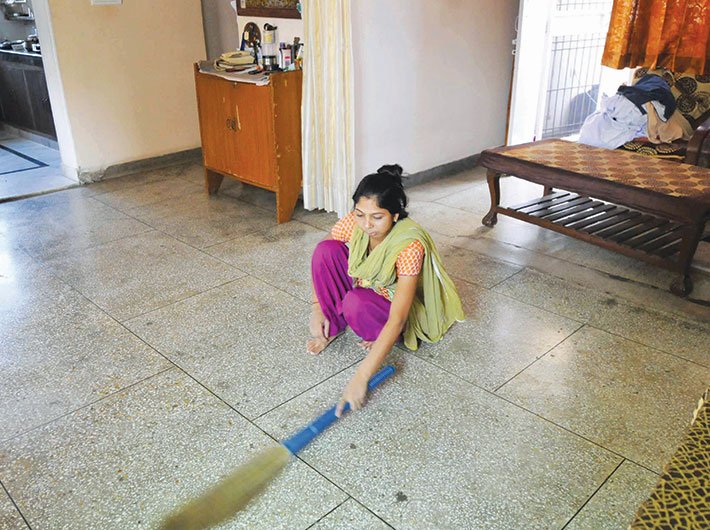Despite numerous policies to protect domestic workers for decades, they continue to suffer emotionally, mentally, and physically
In October, a 14-year-old girl from Jharkhand was rescued from a businessman’s house in Gurgaon, where she had been sent to work as a domestic help by a Delhi-based placement agency. Police found her locked in a cupboard, with bruises all over her body. In September, a Saudi diplomat was accused of raping two domestic helps. Around the same time, Assam MLA Gopinath Das was accused of raped a 14-year-old girl who worked as a domestic help. A month earlier in August, former cricketer Vinod Kambli and his wife allegedly thrashed and abused their maid for asking a salary hike.
Newspapers are full of such reports, where domestic workers are beaten, abused, and sexually assaulted by their ‘powerful’ employers. Yet very little action is taken to protect them.
With an increasing number of women working in urban areas, families are relying more and more on a domestic help to complete their daily chores. According to NSSO in 2011-12, the total number of domestic workers has been estimated at 41.33 lakh, out of which 22.76 lakh women workers are employed in urban areas. Despite such growing numbers of the domestic helpers, not much has been done for their protection and safety.
The Delhi Private Placement Agencies (Regulation) Order 2014 issued following the Delhi high court’s directive in September last year has not made any impact. The order makes it compulsory for the private agencies in Delhi to get registered and provide domestic workers minimum wages and defined working hours. According to the order, all placement agencies will be registered under the Shops and Establishment Act. All domestic workers will be registered online, and all payments to the workers will be done online directly in their bank accounts. “It has been a year since the order was issued but it is not being followed,” says Rakesh Senger, an activist from NGO Bachpan Bachao Andolan.
Agrees Rameshwar Oraon, chairperson, the national commission for scheduled tribes: “Delhi’s order is an executive order; therefore no one is bothered to follow it. There should be a law in Delhi like the Chhattisgarh law that can enable people to go to court if someone does not conform to its rules. The national policy for domestic workers is yet to be drafted.”
In a letter addressed to all chief ministers in May, Oraon noted that migration of tribals seeking jobs for financial and social mobility is unavoidable. However, some protective mechanisms need to be placed in the originating state so as to reduce the instances of exploitation in the hands of private placement agencies and households that employ them. There should be a mechanism for registering these tribals who move from scheduled areas to cities as well as registration of private agencies.
Registration is important not only to curb the exploitation of domestic workers but also to implement various policies to safeguard their interest. Amarjeet Kaur, national secretary, All India Trade Union Congress (AITUC), says, “Any scheme or policy can be implemented only if all domestic workers are registered and have some kind of identity card. All domestic workers should get below poverty line (BPL) cards and employee’s state insurance (ESI) cards, so that they get health benefits, food security, etc. They should also be included in the Minimum Wages Act. Workers employed with the various resident welfare associations (RWAs) should be included in the category of domestic workers.”
Moreover, it is an employer’s responsibility to get the police verification and registration done. Since most of the urban families have no time to verify the certificates, many placement agencies often provide fake certificates. “If they are taking a domestic worker from an unregistered placement agency, the employer is equally part of the crime,” says Rishi Kant, a social activist from Shakti Vahini.
The government too has little or no social commitment or political will towards domestic workers. “More than 95 percent of the entire women labour workforce in India is in the unorganised sector. This factor itself is enough for any government to think about, legislate and form policies to pass an Act. Many orders, schemes and acts have been drafted and re-drafted but none implemented properly,” says Annie Raja, general secretary, National Federation of Indian Women (NFIW).
As a result there is an urgent need for the government to intervene, feels Jagmati Sangwan, general secretary, All India Democratic Women’s Association (AIDWA). “There should be consultation sessions with trade unions and women organisations to give justice to domestic workers. Delhi-based placement agencies send these domestic workers to far-off places in states like Haryana and UP. In such places, there is no one to work for their safety and security and hence they become isolated. If they contact the employer directly, there are risks for physical exploitation and if they are employed through middlemen, there is financial exploitation.”
Resettlement issues
Apart from lack of concrete policies, many domestic workers are also struggling with issues of resettlement. During the preparation for the Commonwealth Games, held in 2010, many colonies of domestic workers were uprooted and re-located to remote and distant areas in the name of beautification. Rapid urbanisation further added to their woes. Many people who were living in places like Safdarjung, Nehru Place, Alaknanda and RK Puram had to move to distant colonies like Madanpur Khadar. “These workers had a network in the areas they used to live before. So now they have to travel a long distance and incur additional travelling cost. Also, many get late to their work due to traffic which angers the employers and they lose their jobs,” explains Chaitali who works with NGO Jagori.
Battling wages
Though domestic workers are included in the Minimum Wages Act, 1948, it is restricted to a few states. Also, the government is preparing to draft a national policy for domestic workers, which will mandate minimum monthly wages apart from other social security schemes. However, the draft is in the making for years and its fate still hangs in balance. Moreover, a major concern regarding these policies is that it has different set of rules for skilled, unskilled, and semi-skilled workers. “On what basis it is decided whether a worker is skilled or not is not clear. There is no proper categorisation and criteria regarding this” says Chaitali.
Experts also blame the private placement agencies for triggering low and reduced wages. When private agencies started mushrooming in the metropolitan cities and provided full-time domestic help at low cost the demand for part-time workers decreased. “In India, the entire system of domestic work still functions in a feudal manner where whims and fancies of the employer decide wages of the domestic help,” says Kavita Krishnan, secretary of the All India Progressive Women’s Association (AIPWA).
“Wages depend on how well the worker is able to negotiate with the employer,” adds Chaitali.
Efforts by states through piecemeal legislation in such an unorganised fashion are designed to fail, says Vikram Srivastava, a child rights lawyer and founder of Independent Thought. “Private placement agencies are flourishing due to multiple reasons; failure to change socio-economic conditions at the ‘source’; failure to learn from previous useless and unused laws; no interstate mechanism to track during ‘transit’ and sheer impossibility of tracking every home at destinations. It is a conscious state ignored situation where everyone benefits except the sufferer,” explains Srivastava.
And social taboos
As it is, the policy environment is not favourable enough, and domestic workers have to also battle social taboos on a daily basis. Explaining this trend, Sonal Sharma, researcher, Centre for Policy Research, says that domestic workers are not allowed to use the same toilet, drinking water, food, utensils, etc. as that of their employers.
“Before the domestic workers were shifted to distant colonies [in Delhi] they could at least go back to their homes to relieve themselves or have food. But after re-settlement, they don’t have an option of travelling to a far-off place as it would incur an additional expense,” says Sharma.
These people are often hired by the urban middle class to sweep and mop their houses and cook food, but are usually considered ‘unclean’ by their employers. They are not allowed to sit on the same sofa or chair. They have to sit on floor and work barefoot, even in winters.
Only strong policies coupled with a change in mindset of employers can bring a change in the lives of these domestic workers on whom our livelihood depends.
yoshika@governancenow.com
(The article appears in the November 1-15, 2015 issue)

